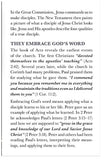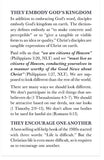The Picture of a Disciple
Special-Order Folded Tract
 NOTE: This item is custom-printed to order (click for more details).
NOTE: This item is custom-printed to order (click for more details).
This tract is from our print-on-demand library, and is not kept in stock. Select the options below, and we will custom-print a batch just for you. Because this item is custom-printed, you can add your custom imprint to the back page at no extra cost.
- Estimated shipping date: Thursday, March 26 (Click for more details)
- SKU:
- Discounts: Discount coupons do not apply to this item
- Format: Folded Tract
- Size: 3.5 inches x 5.5 inches
- Pages: 6
- Imprinting: Available with 4 lines of custom text
- Version: ESV
- Returns: Because this item is custom-printed to order, it cannot be returned.
Show all item details
The full text of this tract is shown below in the ESV version. (Do you want to print this tract in a different version than the one listed? Contact us and let us know what you're looking for—we may be able to create the alternate version for you at no charge.)
On my first day of high school, I was six feet tall. When I went to my physical education class Mr. Koepp approached me and introduced himself as the freshman basketball coach. He asked if I had ever played basketball and told me to try out for the team.
Mr. Koepp took attendance, explained the course expectations, then let us play basketball until the class was over. I grabbed a basketball and played with the other kids, but I was absolutely terrible. While I was taller than everyone else, I lacked many basic skills required for the game.
Mr. Koepp never asked me about playing basketball again. He had a picture of what he wanted in a basketball player. A boy that was tall was only one piece of the picture. He also wanted someone who could dribble, shoot, and play defense.
In the Great Commission, Jesus commands us to make disciples. The New Testament then paints a picture of what a disciple of Jesus Christ looks like. Jesus and His apostles describe four qualities of a true disciple.
THEY EMBRACE GOD’S WORD
The book of Acts reveals the earliest events of the church. The first Christians “devoted themselves to the apostles’ teaching” (Acts 2:42). Several years later, while the church in Corinth had many problems, Paul praised them for studying what he gave them. “I commend you because you remember me in everything and maintain the traditions even as I delivered them to you” (1 Cor. 11:2).
Embracing God’s word means applying what a disciple learns to his or her life. Peter gave us an example of applying what he learned. In 2 Peter he acknowledges Paul’s letters (2 Peter 3:15–17) and how we are supposed to “grow in the grace and knowledge of our Lord and Savior Jesus Christ” (2 Peter 3:18). Peter and others had been reading Paul’s letters, interpreting their meanings, and applying them to their lives.
THEY EMBODY GOD’S KINGDOM
In addition to embracing God’s word, disciples embody God’s kingdom on earth. The dictionary defines embody as “to make concrete and perceptible” or to “give a tangible or visible form to an idea or quality.” Christ’s disciples are tangible expressions of Christ on earth.
Paul tells us that “we are citizens of Heaven” (Philippians 3:20, NLT) and we “must live as citizens of Heaven, conducting yourselves in a manner worthy of the Good News about Christ” (Philippians 1:27, NLT). We are supposed to look different than the rest of the world.
There are many ways we should look different. We don’t participate in the evil things that unbelievers do (1 Thessalonians 4:3–7). We should be attractive based on our deeds, not our looks (1 Timothy 2:9–15). We don’t allow our bodies to be used for lustful sin (Romans 6:13).
THEY ENCOURAGE ONE ANOTHER
A best-selling self-help book of the 1980s started with three words: “Life is difficult.” But the Christian life is even more difficult, so it requires us to encourage one another.
You can’t encourage fellow believers if you are absent from them. We are told to participate in community together in Hebrews 10:24–25, “Let us consider how to stir up one another to love and good works, not neglecting to meet together, as is the habit of some, but encouraging one another.” By meeting together we are able to “encourage one another and build one another up” (1 Thessalonians 5:11). And that only happens when we see one another in fellowship.
We also need to be there for people who need someone. Widows (Acts 6:1–7; 1 Timothy 5:3), orphans (James 1:27), and the poor (Galatians 2:10; Romans 12:13) all need us. Christians sometimes resist the fact that we need other people involved in our lives. We want to be independent. But in the life of a disciple, dependence on others is essential.
THEY EVANGELIZE OTHERS
The New Testament says some people have the “gift” of evangelism and this tempts us to leave it for others gifted in that area. But every disciple is called to evangelize.
A disciple of Jesus Christ shares the gospel regularly. Peter tells us to always be “prepared to make a defense to anyone who asks you for a reason for the hope that is in you” (1 Peter 3:15).
While we might not travel thousands of miles to preach the gospel like Paul or write a letter to many people while exiled on an island like John, we must be ready to share the gospel in every situation.
I have not always been a good disciple. For a period of my life I engaged in deep study of Scripture while not encouraging others who needed it. At another time I was so focused on being a good Christian that I neglected to tell others about Jesus. But the New Testament paints a complete picture of what it means to be a disciple of Jesus. Like Mr. Koepp, my PE teacher, our Lord wants people playing for His team who are well-rounded. Disciples should pursue all of these qualities: embracing His word, embodying His kingdom, encouraging one another, and evangelizing others.













